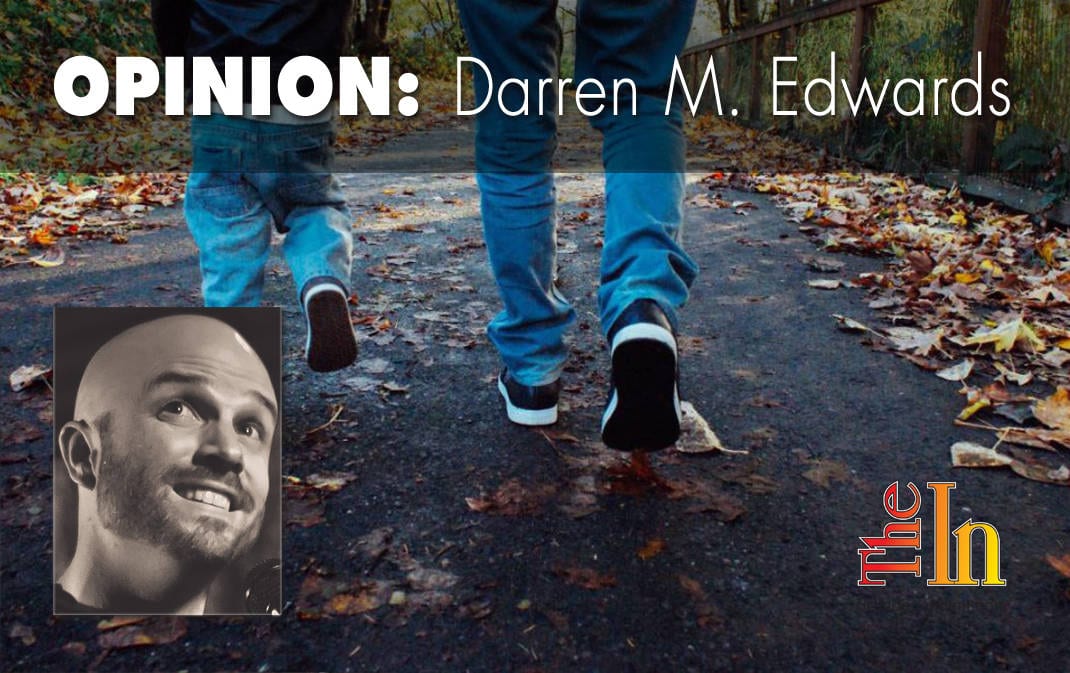 As some of you know, my wife and I are expecting our first child in June. Well, I guess we already have him. I mean, somebody’s been stepping on my wife’s bladder, and it ain’t me. So yeah, my wife and I are expecting our son, who is currently squatting near her bellybutton, to shoot out from her nethers and into our loving arms sometime in the beginning of June. Naturally, this has led me to reflect on the challenges that lie ahead of us, the fact that this tiny flesh monster — with Jedi mind trick eyes that I’m sure will turn my heart into a puddle of goo with a glance — is going to be completely reliant on us for his basic understanding of the world not least among them. There is so much we will need to teach him, and there are more than enough people willing to give us their old lesson plans. In thinking about all of these ideas, I’ve come up with a list of ten lessons I will not teach my son.
As some of you know, my wife and I are expecting our first child in June. Well, I guess we already have him. I mean, somebody’s been stepping on my wife’s bladder, and it ain’t me. So yeah, my wife and I are expecting our son, who is currently squatting near her bellybutton, to shoot out from her nethers and into our loving arms sometime in the beginning of June. Naturally, this has led me to reflect on the challenges that lie ahead of us, the fact that this tiny flesh monster — with Jedi mind trick eyes that I’m sure will turn my heart into a puddle of goo with a glance — is going to be completely reliant on us for his basic understanding of the world not least among them. There is so much we will need to teach him, and there are more than enough people willing to give us their old lesson plans. In thinking about all of these ideas, I’ve come up with a list of ten lessons I will not teach my son.
You’re perfect just the way you are
 He’s not. In my wife’s belly, right now, he’s not perfect. When he’s born he will not be perfect. When he learns to walk, drive, work, pay taxes, and wipe my incontinent ass, he will not be perfect. Perfection is a dangerous idea. Believing that you are perfect can lead to narcissism and arrogance or worse Trump-ness. Believing that you should be perfect can lead to depression, self-doubt, fear of failure, and a crushing, inescapable sense of pressure.
He’s not. In my wife’s belly, right now, he’s not perfect. When he’s born he will not be perfect. When he learns to walk, drive, work, pay taxes, and wipe my incontinent ass, he will not be perfect. Perfection is a dangerous idea. Believing that you are perfect can lead to narcissism and arrogance or worse Trump-ness. Believing that you should be perfect can lead to depression, self-doubt, fear of failure, and a crushing, inescapable sense of pressure.
I want him to know that he is a wonderful evolving ball of imperfections. That he should focus less on hyperbolic ideas like perfection and more on concrete ideas like kindness, trustworthiness, hard work, and creativity.
Men don’t cry
 This is a really outdated idea, but I still hear it all too often. Can men cry? Well, unless they are born without tear ducts, yes. But more importantly, I hope that my son will be able to transcend the suffocating gender labels we’ve accepted over the last century. From the ultrasound, we know that our child is going to be born with a penis and testicles (Hurray!). That’s as far as I’m willing to impose gender on him. If he grows into a strong, athletic, bearded, hairy-chested (and let’s face it, since he’s my son, hairy-backed) He-man or what some people would call an effeminate, high voiced, limp-wristed (please note that I’m using these not as legitimate terms but to point out how ridiculous they are) Nancy-boy, that is his journey to take, his exploration to conduct. If he likes girls, if he likes boys, if he decides that he’s actually a she, these are not spots for me to impose an outdated world view upon him. At his core, I hope he is and always will be a beautiful exploration of self.
This is a really outdated idea, but I still hear it all too often. Can men cry? Well, unless they are born without tear ducts, yes. But more importantly, I hope that my son will be able to transcend the suffocating gender labels we’ve accepted over the last century. From the ultrasound, we know that our child is going to be born with a penis and testicles (Hurray!). That’s as far as I’m willing to impose gender on him. If he grows into a strong, athletic, bearded, hairy-chested (and let’s face it, since he’s my son, hairy-backed) He-man or what some people would call an effeminate, high voiced, limp-wristed (please note that I’m using these not as legitimate terms but to point out how ridiculous they are) Nancy-boy, that is his journey to take, his exploration to conduct. If he likes girls, if he likes boys, if he decides that he’s actually a she, these are not spots for me to impose an outdated world view upon him. At his core, I hope he is and always will be a beautiful exploration of self.
Violence never solved anything
 “You’re going to condone violence to your son?” No. But I also don’t intend to paint the world as a monochromatic unicorn fart. Violence has absolutely solved things. Is it the best solution? The first solution? No. But, I want him to grow up knowing that things are much more complicated than that. Do I hope he would never feel justified in harming someone when it wasn’t necessary? Yes. Do I hope he never finds himself in a situation where violence becomes the best answer (say protecting someone from a violent crime)? Lords, yes. But do I want to paint his reality in landscapes void of certain colors? Absolutely not.
“You’re going to condone violence to your son?” No. But I also don’t intend to paint the world as a monochromatic unicorn fart. Violence has absolutely solved things. Is it the best solution? The first solution? No. But, I want him to grow up knowing that things are much more complicated than that. Do I hope he would never feel justified in harming someone when it wasn’t necessary? Yes. Do I hope he never finds himself in a situation where violence becomes the best answer (say protecting someone from a violent crime)? Lords, yes. But do I want to paint his reality in landscapes void of certain colors? Absolutely not.
You can accomplish anything you put your mind to
 As a child, I wanted to play in the NBA. My father never shot this dream down. He did emphasize the hard work it would take and the obstacles I would face as someone who would probably never break six feet tall. However, I hope that if I’d told him I wanted to be a world-class singer, he wouldn’t have deluded my tone-deaf ass into thinking it was possible. The reality is that some things are out of each of our realms of possibility. If my son ends up growing to be a healthy six-foot, six-inch 250 pounds, the sad truth is that he will never be a jockey. Helping him learn to deal with these difficult truths is my job. Protecting him from them is not.
As a child, I wanted to play in the NBA. My father never shot this dream down. He did emphasize the hard work it would take and the obstacles I would face as someone who would probably never break six feet tall. However, I hope that if I’d told him I wanted to be a world-class singer, he wouldn’t have deluded my tone-deaf ass into thinking it was possible. The reality is that some things are out of each of our realms of possibility. If my son ends up growing to be a healthy six-foot, six-inch 250 pounds, the sad truth is that he will never be a jockey. Helping him learn to deal with these difficult truths is my job. Protecting him from them is not.
Remember every girl is someone’s daughter or sister or mother
 While this statement is true, it stops well short of where it should. Every girl is a human being, and that should be enough for him to treat them with respect and courtesy, just like he should treat every boy or gender-fluid individual. Because they’re all human. He shouldn’t have to picture a girl as somebody’s daughter in order to see her as a person. And every statement made to teach boys to respect women can just as easily be expanded to all people.
While this statement is true, it stops well short of where it should. Every girl is a human being, and that should be enough for him to treat them with respect and courtesy, just like he should treat every boy or gender-fluid individual. Because they’re all human. He shouldn’t have to picture a girl as somebody’s daughter in order to see her as a person. And every statement made to teach boys to respect women can just as easily be expanded to all people.
Now, because we live in a patriarchy, it becomes extra important that, if we are going to expand those lessons to all people, thus removing the emphasis from women, we double our efforts in teaching him that women are people — not objects, not sex toys, not lower-class citizens, and not the weaker sex — because we’ll need to counter the constant barrage of cultural messages trying to teach him that women are those things.
Try not to be wrong
 It’s okay to be wrong. It’s normal to be wrong. Being wrong is human. It’s a step on the path to being right. However, in school, from the first quiz he’ll ever take, the idea that wrong is the worst thing he can be will hit my son over and over again. Wrong means we didn’t try hard enough. A wrong answer means there is something wrong with us. This leads us to always want to feel right, to always believe we are right. When we learn that it’s not okay to be wrong, it makes it that much harder for us to accept it when we are, and that keeps us rooted there, in the wrong, blissfully believing we are right. (For more on this idea, check out this TED Talk by Kathryn Schulz.)
It’s okay to be wrong. It’s normal to be wrong. Being wrong is human. It’s a step on the path to being right. However, in school, from the first quiz he’ll ever take, the idea that wrong is the worst thing he can be will hit my son over and over again. Wrong means we didn’t try hard enough. A wrong answer means there is something wrong with us. This leads us to always want to feel right, to always believe we are right. When we learn that it’s not okay to be wrong, it makes it that much harder for us to accept it when we are, and that keeps us rooted there, in the wrong, blissfully believing we are right. (For more on this idea, check out this TED Talk by Kathryn Schulz.)
There are no stupid questions
There are billions of stupid questions. That doesn’t mean you shouldn’t ask them. In fact, those are sometimes the most important ones to ask. If someone  explains that a specific card game is played without the joker, and I’m too busy thinking about having an otter as a pet to hear them, then when I ask “So, how many points is the joker worth?” That is a stupid question. But, if I don’t ask it, I could mess up the game for everyone. Really, a stupid question can be any question that shouldn’t need to be asked (but does) or any question that you feel stupid asking — like in second grade when Jill Scott asked what a queef was. She felt stupid asking it, but we all learned something. Saying that there are no stupid questions leaves kids feeling all that much worse about themselves when they have a stupid question. I want my son to know that everyone has stupid questions sometimes, that it’s okay to ask them, and that it doesn’t mean he’s stupid.
explains that a specific card game is played without the joker, and I’m too busy thinking about having an otter as a pet to hear them, then when I ask “So, how many points is the joker worth?” That is a stupid question. But, if I don’t ask it, I could mess up the game for everyone. Really, a stupid question can be any question that shouldn’t need to be asked (but does) or any question that you feel stupid asking — like in second grade when Jill Scott asked what a queef was. She felt stupid asking it, but we all learned something. Saying that there are no stupid questions leaves kids feeling all that much worse about themselves when they have a stupid question. I want my son to know that everyone has stupid questions sometimes, that it’s okay to ask them, and that it doesn’t mean he’s stupid.
Look out for the friend zone
 Unless I mean, “Look out for the friend zone so you don’t miss it,” this is a terrible lesson, but one that I’ve heard fathers give their sons. The concept behind the friend zone (that if a man puts enough time and effort into romancing a woman she should owe him something) is abhorrent and, like it or not, promotes rape culture. If someone wants to be my son’s friend and he feels romantic emotions conflicting with that, I’d hope he realizes first that it’s his problem to deal with, not hers, and second that feeling rejected isn’t worth losing a friend. The hurt of rejection will wither away long before true friendship will.
Unless I mean, “Look out for the friend zone so you don’t miss it,” this is a terrible lesson, but one that I’ve heard fathers give their sons. The concept behind the friend zone (that if a man puts enough time and effort into romancing a woman she should owe him something) is abhorrent and, like it or not, promotes rape culture. If someone wants to be my son’s friend and he feels romantic emotions conflicting with that, I’d hope he realizes first that it’s his problem to deal with, not hers, and second that feeling rejected isn’t worth losing a friend. The hurt of rejection will wither away long before true friendship will.
No means no
 Obviously, I’m referring to sex here, but also everything else. If I want to drive my neighbor’s mustang (it’s a really nice shiny black one), they shouldn’t have to stop me from hot-wiring it to tell me, “No, you can’t take it for a joy ride.” I shouldn’t even try to get into it until they’ve told me, “Yes, by all means see how fast you can get it going.” So yes, no means no. But there are a million other things that can mean no. If someone’s body language seems tense and uncomfortable, that can mean no. Closed eyes can mean no. Silence can mean no. I’d hope my son doesn’t live with his foot on the gas until someone throws up a red light. Rather, I would have him looking for consent, not waiting for someone to tell him when he’s crossed the line into no. I would also hope that my son grows up knowing both that he can say no and that no one has the right to assume his silence is a yes. (For more on this idea and the fact that a yes is not permanent and should be allowed to shift to no at any time, go here).
Obviously, I’m referring to sex here, but also everything else. If I want to drive my neighbor’s mustang (it’s a really nice shiny black one), they shouldn’t have to stop me from hot-wiring it to tell me, “No, you can’t take it for a joy ride.” I shouldn’t even try to get into it until they’ve told me, “Yes, by all means see how fast you can get it going.” So yes, no means no. But there are a million other things that can mean no. If someone’s body language seems tense and uncomfortable, that can mean no. Closed eyes can mean no. Silence can mean no. I’d hope my son doesn’t live with his foot on the gas until someone throws up a red light. Rather, I would have him looking for consent, not waiting for someone to tell him when he’s crossed the line into no. I would also hope that my son grows up knowing both that he can say no and that no one has the right to assume his silence is a yes. (For more on this idea and the fact that a yes is not permanent and should be allowed to shift to no at any time, go here).
Never compromise your beliefs
 (See number one.) My son will not be perfect. Whatever beliefs he picks up from his mother and me or develops on his own will not be perfect. Rather than teaching him to be bullheaded in blindly sticking to a belief, I’d rather teach him to constantly examine all of his beliefs. Just like he is an evolving ball of imperfections, his beliefs should be constantly growing and changing as he acknowledges and works through the cognitive dissonance that often accompanies the introduction of new facts or ideas which appear contrary to a previously held belief.
(See number one.) My son will not be perfect. Whatever beliefs he picks up from his mother and me or develops on his own will not be perfect. Rather than teaching him to be bullheaded in blindly sticking to a belief, I’d rather teach him to constantly examine all of his beliefs. Just like he is an evolving ball of imperfections, his beliefs should be constantly growing and changing as he acknowledges and works through the cognitive dissonance that often accompanies the introduction of new facts or ideas which appear contrary to a previously held belief.







Thank you for this post. I agree with most of what you said. I especially appreciated the link to the Ted Talk about being wrong.
Ted Talks are the best. Thanks for the comment, Laura!
Interesting. Shows you have put some thought into what is soon to be the most important role you will ever play in your life…Dad. Your writing flows well and it’s easy to read.
Make yourself one promise. Promise that you will pick this piece up say five years from now when you have a little experience under your belt. My bet is you will have a good chuckle. And, it will be good fodder for another article titled something like ”What I Have Learned About Fatherhood Over the Past Five Years.’
Good luck with the new baby. You’re going to love being a dad.